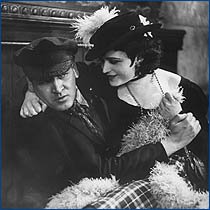
"THE WOMAN HE SCORNED" (also known as "THE WAY OF LOST SOULS" or, as this German Count would go on to say, also known in the frenchified tongue as "Son Dernier Tango" considering that the intertitles of this film are written in this last language) is a worthy silent film. This aristocratic German Count says that in light of the fact that "The Woman He Scorned" has a very remarkable first part, comprising those scenes taking place in the port, and most specifically at the bar, the place in which Louise (Pola Negri) and Maxim (Rehmann) get to know each other.
In the claustrophobic, rarefied atmosphere of that port, amongst plenty of riffraff, Miss Pola fascinates the audience as a woman leading a dissolute life; in that sick locale she gets to know, with wearisome insistence, the lonely and sullen town lighthouse-keeper. Miss Pola attempts to change her miserable life through her dear lighthouse-keeper but you know, because she had been a very bad woman in that rotten harbor atmosphere, before long she will have a visitor who will let her know that it is not very easy to wipe the slate clean and start again however much she may now be a happy housewife who even affectionately prepares breakfast and dinner for her dearest lighthouse-keeper.
A very remarkable film with some Expressionistic influences that this German Count recommends highly to you, not forgetting two other exceptional films by Herr Czinner, "FRAULEIN ELSE" (1928) (see German aristocratic comments in the blog) and "NJU" (1924), this one undoubtedly indebted to the German Expressionist glories and the undeniably pleasing presence of Miss Bergner, wife and muse of the German director, in a film that depicts another harmful menage-a-trois (despite the fact that Herr Czinner belongs to the middle class it seems that he was a little too loose-living for this German Count).
And now if you'll allow me I must leave you momentarily because, as a devotee of La Negri, this German aristocrat must busy himself with whipping his servants.
Herr Graf Ferdinand Von Galitzien
-/-
“THE WOMAN HE SCORNED” también conocida cómo “THE WAY OF LOST SOULS”, e incluso diría más éste aristócrata germano, también conocida en idioma afrancesado cómo “Son Dernier Tango”, idioma éste en el cual estaban redactados los rótulos de ese más que apreciable filme, es un filme realmente apreciable.Y es que “The Woman He Scorned” posee una primera parte realmente magnífica, la que transcurre en la zona portuaria y más específicamente en la tasca en donde se conocen Louise ( Damen Negri ) und Maxim ( Herr Rehmann ).
Un ambiente canalla, claustrofóbico, enrarecido y en el cual Damen Pola fascina al espectador desde su primera aparición en dicho antro como mujer de mala vida; en esta atmósfera enfermiza conocerá, no sin cierta insistencia ( y es que ya se sabe cómo son las mujeres malas y de clase media ordinaria… ) al farero taciturno y solitario del pueblo.Damen Pola intentará cambiar de vida con el farero de sus amores pero ya se sabe, cómo ha sido muy mala en esos ambientes portuarios, recibirá una visita inesperada qué le recordará posteriormente que no es fácil hacer borrón y cuenta nueva por mucho que ahora le prepare el desayuno y le haga la comida a su farero.
Un filme realmente magnífico, con ciertos tintes expresionistas y que éste Conde le recomienda de forma encarecida a todos ustedes, sin olvidar otros dos filmes excepcionales de Herr Czinner, “FRÄULEIN ELSE” (1928) ( ver comentarios aristocráticos en este diario moderno ) y “NJU” (1924) éste sí más deudor de las glorias del expresionismo y que cuenta con la presencia siempre grata de Damen Bergner, esposa y musa del director alemán, en lo que es otro triángulo nocivo amoroso ( desde luego Herr Czinner era un poco libertino para ser de clase media…).
Y ahora si me lo permiten les dejo momentáneamente pues cual “devotee” de Pola Negri este aristócrata germánico va a dar de latigazos a todo su servicio doméstico.
Herr Graf Ferdinand Von Galitzien

Keine Kommentare:
Kommentar veröffentlichen